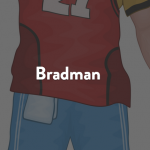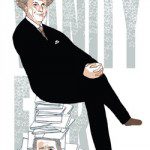Death of a ”Gotcha” Journalist
How I lost my taste for blood
The first story I wrote for a national magazine got a successful man fired. He was an accidental casualty, because the sad irony is that this story was titled “How to Stay Hired.” Written for Report on Business magazine, it explored the roles of communication and office culture in determining how long a new executive lasts in his job. The man I torpedoed was the new marketing director for the Canadian branch of a multinational corporation, and he was just a little too forthcoming about the difficulty he was having in getting his department turned in the direction he wanted. He was the perfect illustration of the problem I was uncovering, and I knew as I was sitting in his office, recording the gold spilling from his mouth, that his bosses were going to be ticked. I just had no idea to what extent. The day the magazine landed on their desks, they called him out of a conference and told him he was through. I learned this because after getting fired, the first thing he did was call me. “You’ve killed me,” he shouted, almost weeping. “You’ve killed me!”
And my reaction to this news as a young magazine editor and freelance writer was to be, quietly and a little nervously, thrilled. The sense of power and responsibility was intoxicating; I suddenly knew how dogs felt when they got their first taste of blood. The trouble I brought to this man and his family I managed to rationalize away-he was a marketing director, he should have known better-and for the next 10 years or so I looked for opportunities to duplicate the high of notching my first journalistic victim. I became on some level the magazine version of a “gotcha” journalist, scanning subjects for the rope with which they might hang themselves. It was an approach that generated a lot of angry letters from the people I wrote about (I kept a list of the hateful adjectives they used), but it served me well, particularly writing for a business magazine that wasn’t afraid to be critical. And it lasted roughly until the day I became a novelist.
Did I start pouring myself into fiction because I’d lost my journalistic taste for blood? Or did I lose that appetite because writing fiction had introduced me to something sweeter and more satisfying? It’s hard to know the precise order of all the causes and effects. A couple of the stories I wrote during my transition seemed in some ways gentler, and perhaps richer, than anything I’d done before. I do know that my attitude toward magazine work changed most dramatically after I wrote my first published novel, Norman Bray in the Performance of His Life. The main character of that book is a bullying out-of-work narcissist and, had I been writing a magazine feature, he would have been the perfect object of a gleeful skewering. But cynicism doesn’t work in fiction; a novelist cannot pull readers into his story unless he has empathy for his subject, and the success of Norman Bray-and for me the joy of writing it-lay in getting to know and love that character better than he knew and loved himself. In this, it helped that Norman was based on my father, but now I have a model against which I will be able to gauge all my future work. I know what being truly empathetic as a writer feels like. The story I’m probably most notorious for, a profile of Leah McLaren for Toronto Life magazine, marks the last flare-up of my old way of doing things. I wrote it immediately after finishing Norman Bray, and I went into it laden with all my usual hard, cynical tools. But halfway through my research for that piece, I sensed that something was different. I could tell the story was evolving into something that my subject would find painful, and though in the past that realization would merely have spurred me on, this time, for the first time, I felt conflicted. It’s easy to say now, and I’m sure small consolation for Ms. McLaren, but I had a number of sleepless nights trying to sort out the arguments in my head. In the end I went ahead with the piece, and it was criticized by some as mean-spirited. Russell Smith, in a column, decried its lack of compassion. He was thinking like a fiction writer, and I get it now.
I still do magazine work, of course, but these days I know that it is possible to get at the truth in a piece of journalism without leaving bodies in my wake. The goal of any interview is still to get the subject to open up, to expose himself in a way that he never intended, but now when it happens I reach for a magnifying glass, not the nearest sharp object. And I bring the same approach to my fiction. It’s still astonishing to me when reviews of my novels cite compassion as one of their central traits.
I am clearly not the writer I was.














